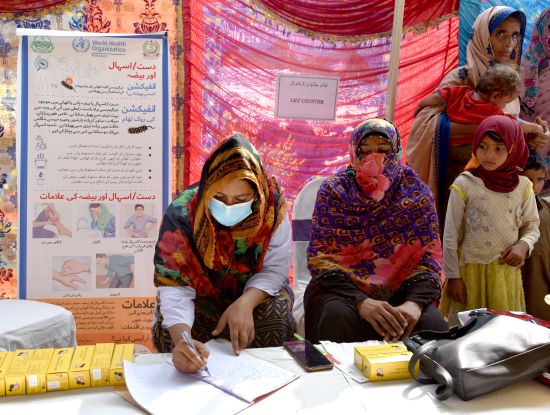 A health worker providing medical assistance at a medical camp in Punjab province. WHO Pakistan
A health worker providing medical assistance at a medical camp in Punjab province. WHO Pakistan
Cairo/Islamabad, 8 November 2022: Over the past few weeks, flood waters have continued to recede in many flood-affected areas across Pakistan, but enormous volumes of persistent flood waters remain stagnant in many places.
Around 8 million flood-affected people need health assistance, including the provision of essential medical supplies and access to essential health care.
To date, just 9% of the US$ 81.5 million WHO requires to respond to this health crisis has been received. This critical funding enables WHO to ensure coordinated delivery of essential health care services, efficient management of severe acute malnutrition and more robust outbreak detection and control.
Internally displaced populations are returning to their homes, only to face an increased risk of disease driven by damaged infrastructure, stagnant water and inadequate sanitation facilities.
A total of 1003 confirmed cholera and 64 767 dengue fever cases, with 147 deaths, have been reported since the beginning of the year. Malaria remains a major concern in flood-affected areas.
Hunger too is looming, as crops and stocks have been washed away, further aggravating the high malnutrition rates among pregnant and lactating women and children under five years of age.
So far, 306 106 children under five have been diagnosed with severe acute malnutrition and 659 076 pregnant women will need access to clean and safe delivery services over the next 6 months
WHO has developed an integrated health operations plan to align coordination and response interventions, including those for: health service delivery: reproductive, maternal, newborn and child health; nutrition; infection prevention and control; water, sanitation and hygiene; vector-borne diseases; immunization; and noncommunicable diseases.
Over the past weeks, WHO has:
Established 10 emergency operations centres and three operational hubs in Sukkur, Hyderabad and Naseerabad districts, to strength the management and coordination of the overall health response.
Distributed medicines and emergency supply worth over US$ 1.59 million. Over US$ 6 million worth of supplies are in the pipeline, procured both locally and internationally. There is stock worth US $ 1.3 million ready to be distributed.
Conducted vaccination campaigns against measles and rubella in Baluchistan and KPK provinces and started campaigns in Panjab and Sindh provinces.
Completed a high coverage oral cholera vaccine campaign in Baluchistan, KPK, Punjab and Sindh provinces.
Supported early diagnosis and treatment of malaria and helped improve access to clean water through the establishment of water treatment plants.
Strengthened the surveillance system by establishing an emergency disease surveillance system in cooperation with the Ministry of Health.
Activated a prevention and response to sexual exploitation, abuse and harassment system and community-based psychosocial support through mobile and telemedicine clinics in 29 priority flood-affected areas.



